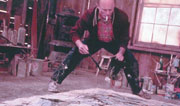“FUCK PICASSO!” bellows a raging drunk in 1941 New York City, and we wouldn’t pay any attention to the guy if we didn’t know he’s Jackson Pollock. This is the bellicose, manic, chip-on-his-shoulder painter before fame, the unwelcome glare of which actor/director Ed Harris uses to frame his account of the pioneering abstract expressionist. The first thing that strikes us is Harris’ uncanny resemblance to the man (1912-1956), and the long-brewing Pollock has long been viewed as the actor’s ideal directorial debut. Indeed, the project is an apt pairing of subject and interpreter— although the exact meaning of things, in both the paintings and the film, is Pollock‘s least convincing aspect.
POLLOCK
directed by Ed Harris with Ed Harris, Marcia Gay Harden, Jeffrey Tambor, and Amy Madigan opens February 23 at Guild 45th
Initially, however, the brush strokes are well placed: Pollock’s living and painting in obscurity, poor and ignored, when he’s visited by fellow painter Lee Krasner (Marcia Gay Harden of Miller’s Crossing). Direct, outspoken, and vivacious, she does enough talking for the two of them, and soon the brooding, taciturn Pollock falls for her. As director, Harris treats their first intimate encounter with lovely restraint, their tentative embrace framed in a shadowy tenement hallway. The implication is unmistakable: Krasner gives herself—and all her self-confidence—to the struggling artist like a gift. She’s the active party, the seducer; he’s the seductee. She becomes his muse, manager, and mother, making her career of his art.
Decamping to Long Island, the couple finds a bohemian rural idyll—and a reprieve from Pollock’s alcoholic benders in Manhattan. There, Krasner builds a wall against supposedly bad influences—sure, she’s overprotective, but the guy invents drip painting in 1945, so who can argue with her intentions or their results? Pollock also picks up a rich, famous patron, Peggy Guggenheim (played with pinched lips by the director’s wife, Amy Madigan) and finds a champion in the academy in the lumpy form of critic Clement Greenburg (an amusingly droll Jeffrey Tambor).
ALL THAT SUPPORT, however, can’t allay Pollock’s hunger for recognition—which leads him to agree to have his drip-painting technique filmed in 1950. Harris presents this as his downfall, taking his thesis from a shallow, controversial 1990 biography that underlies much of the movie. Yet Pollock’s subsequent lament—”I feel like a phony”—seems too pat an encapsulation of his subsequent booze-fueled decline. (Did the camera steal his soul, sap his organic strength, or was he just a surly drunk?)
The film’s on more solid ground when simply showing its subject at work, swooping and dancing over his canvases like a grunting, bald Gene Kelly. Harris obviously admires the guy as a paladin of artistic purity but never shies away from showing the painter’s ugly side. A stormy, complicated marriage is also as much Pollock’s subject as art, with Harris and Harden having received Oscar nominations for their excellent work.
Still, in the genre of portrait-of-the-artist films, the current, ragged Before Night Falls works far better because it’s more impressionistic, less studiously methodical. Pollock is too strict in its recapitulation of a messy life. There’s a certain ridiculous literal-mindedness to a movie that has its blocked protagonist paint his first big mural, then race to the toilet in relief. (Catharsis!) For all the ’50s infatuation with Jung, Freud, psychoanalysis, and displaced libido, Pollock unnecessarily dates itself by repeating the pop psychology with the period.
Inarticulate yet expressive in his inchoate way, Pollock loves music, and when we briefly hear Billie Holiday croon, “I’ve got a man. . . . He’s funny that way,” it sums up his lasting contradictions. Pollock does preserve an essential, appropriate mystery to the man’s erratic, surging creativity: Why did his genius come, then so abruptly go? It’s an unanswered question that puts you in mind of another Billie Holiday lyric: “Hush now, don’t explain.”








